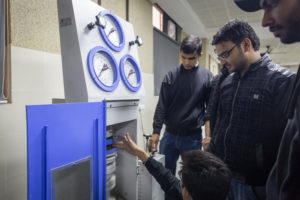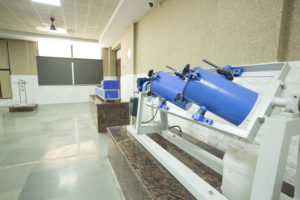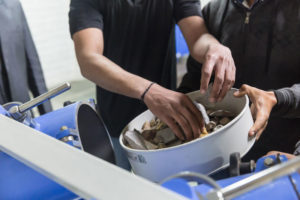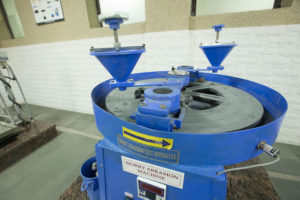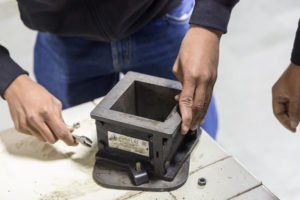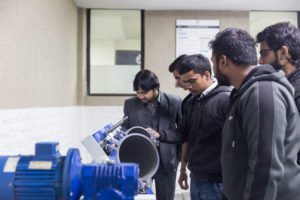In its simplest form, concrete is a mixture of paste and aggregates (rocks). The paste, composed essentially of portland cement and water, coats the surface of the fine (small) and coarse (larger) aggregates. Through a series of chemical reactions called hydration, the paste hardens and gains strength to form the rock-like mass known as concrete. The testing and inspection of concrete and concrete aggregates are important elements in obtaining quality construction. The laboratory allows students test to assess the various fresh and hardened concrete properties that may affect the performance of concrete members. There many apparatus and machines available at the concrete technology lab like Sieve Shaker, Compressive testing machine, Flexure Testing Machine, Compaction Factor Apparatus, Heat of Hydration apparatus, Permeability apparatus etc
The objective of the concrete laboratory is to determine the physical properties of building construction materials like cement, fine and coarse aggregate, steel, wood, and strength characteristics of cement mortar, plain cement concrete, and reinforced cement concrete. The tests include determination of specific gravity, fineness, normal consistency, setting times, workability and soundness of cement, fineness modulus of fine and coarse aggregate, strength of cement mortar, cement concrete and bricks, tensile test on steel rods, bending and flexural strength on concrete, bending test on wood, and non-destructive test on concrete. The students will be able to infer the suitability of these materials for construction. They can design the mix, make the specimens and test the same for the strength for comparison with design strength. This laboratory course will help the students to understand the theoretical concepts learned in the course building materials.
Objectives of the course: The objective of this course are summarized as follows:
- Providing the students with sufficient information about the principles of production of concrete material, its constituents, and behaviors.
- Qualifying the students in controlling the quality of fresh and hardened concrete in both lab and field.
- Teaching the students for taking into account the sustainability aspects of producing concrete
Outcomes of the Course: After completion of the course students will cater theoretical as well as practical knowledge.
- Understand properties and role of ingredients like cement, aggregate, admixtures etc. to produce better quality concrete.
- Execute experiments related to concreting ingredients & mapping of data with code stipulations.
- Apply design mix concepts to produce concrete with adequate strength and durability.
- Perform destructive, semi-destructive and non-destructive tests for concrete.
- Demonstrate advancements in concreting materials and techniques.
- Composition of concrete, advantages & disadvantages.
- Cement (manufacture, chemistry, hydration types, and tests)
- Aggregate (classification, mechanical and physical properties and tests)
- Requirements for mixing water
- Mineral Admixtures (their types and usage)
- Properties of fresh concrete
- Mixing handling, placing and compacting of concrete
- Concrete mix design.
- Properties of hardened concrete
- Durability of concrete
The testing and inspection of concrete and aggregates are important elements in obtaining the quality construction of infrastructure. The laboratory allows students test to assess the various fresh and hardened concrete, aggregate properties that may affect the performance of concrete structures.

